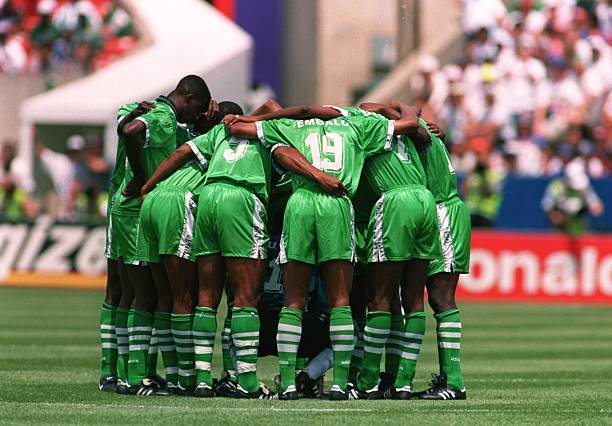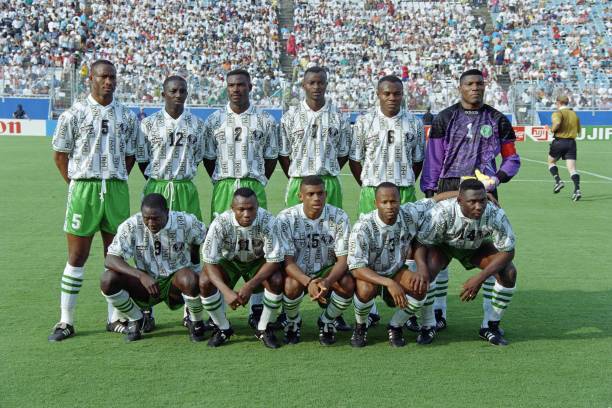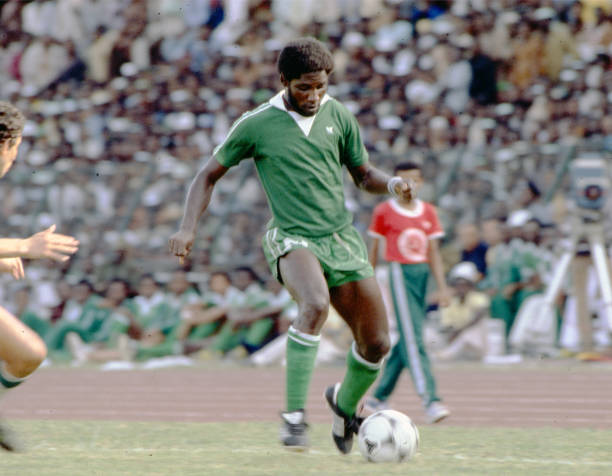
Nigerian football history is a rich tapestry of passion, triumph, and challenges that have shaped the country’s footballing identity. From its humble beginnings to becoming one of Africa’s footballing powerhouses, the journey of Nigeria’s national football team, the Super Eagles, is filled with unforgettable moments. Nigerian football history reflects not only the evolution of the sport in the country but also the political, social, and cultural changes that influenced the game. In this article, we will delve deep into the untold story of Nigerian football history, exploring key moments that marked the rise of one of Africa’s greatest footballing nations.

From L to R (2nd row): Okechukwu Uche (5), Samson Siasia (12), Augustine Eguavoen (2), George F (7), Chidi Nwanu (6), Peter Rufai (1).
From L to R (1st row): Rashidi Yekini (6), Emmanuel Amunike (11), Sunday Oliseh (15), Benedict Iroha (3), Daniel Amokachi (14). AFP PHOTO TIMOTHY A. CLARY / AFP PHOTO / – (Photo credit should read -/AFP via Getty Images)
7. The Early Days: Birth of Nigerian Football
The origins of Nigerian football history date back to the colonial era when British expatriates introduced the sport to the country. The first recorded football match in Nigeria was played in 1904 between British expatriates and a local team. However, the real emergence of football in Nigeria began in the 1940s and 1950s. During this period, the country saw the formation of local clubs, and many Nigerians began playing the game passionately, with football becoming a significant part of local life.
Nigeria’s footballing roots were firmly planted in these early years, but it was not until the country’s independence in 1960 that Nigerian football began to gain more international attention. The growth of the Nigerian Football Federation (NFF) in the 1950s and 1960s was pivotal in organizing the country’s footballing infrastructure, laying the groundwork for future successes.
6. Nigeria’s First International Tournament – The 1963 AFCON
One of the most significant moments in Nigerian football history came in 1963 when the country participated in its first-ever Africa Cup of Nations (AFCON) tournament. Nigeria’s national team, known as the Green Eagles, entered the competition with a strong lineup, and their performance exceeded expectations. Though they did not win the title, their strong showing in the tournament marked Nigeria’s entry into international football competitions.

The Green Eagles continued to grow in stature, and by the 1970s, Nigerian football had begun to show its potential. However, it was the rise of African football in the 1970s that would provide a platform for Nigeria to showcase its talents on the continental stage.
5. The Golden Era: 1980-1990
The period from 1980 to 1990 is considered the golden era of Nigerian football history. It was during this time that the Green Eagles, now known as the Super Eagles, became a dominant force in African football. The Super Eagles’ first major achievement came in 1980 when they won the Africa Cup of Nations for the first time, defeating Algeria 3-0 in the final. This victory was not only a historic moment for Nigerian football but also a sign of the country’s growing footballing prowess.

In the years that followed, Nigeria continued to build on this success. The 1980s saw Nigeria qualify for its first World Cup in 1994, thanks to an inspiring team filled with stars such as Segun Odegbami, Muda Lawal, and the legendary goalkeeper Peter Rufai. During this period, Nigerian football was elevated to new heights, with a growing fanbase both at home and abroad.
4. Nigeria at the 1994 World Cup: A Landmark Achievement
The 1994 World Cup in the United States marked a defining moment in Nigerian football history. Under the management of Clemens Westerhof, the Super Eagles arrived at the tournament with high hopes and expectations. Their performances were nothing short of spectacular as they reached the Round of 16, finishing top of their group ahead of teams like Argentina and Bulgaria. The team’s dazzling football, led by players such as Jay-Jay Okocha, Nwankwo Kanu, and Emmanuel Amunike, captured the world’s attention.

Although Nigeria was eliminated in the Round of 16 by Italy, the Super Eagles’ performance in 1994 marked Nigeria’s arrival on the global football stage. The country’s first-ever World Cup appearance brought Nigerian football into the spotlight, and the Super Eagles quickly became one of the most exciting teams in world football.
3. The 1996 Olympic Games: Nigeria’s First Gold
Another landmark achievement in Nigerian football history came in 1996 when Nigeria’s men’s football team won the Olympic gold medal at the Atlanta Games. Under the guidance of Dutch coach Jo Bonfrère, the Super Eagles triumphed in an unforgettable final against Argentina. The team’s victory over the South American giants made Nigeria the first African nation to win Olympic gold in football, adding another prestigious title to the nation’s footballing resume.
The success of the 1996 Olympic football team was a turning point for Nigerian football, solidifying the country’s status as a force to be reckoned with in international competitions. Players such as Nwankwo Kanu, Austin Okocha, and Daniel Amokachi became national heroes, and the gold medal served as a symbol of Nigeria’s potential to succeed on the global stage.
2. The Revival of Super Eagles in the 2000s
After a period of relative decline in the early 2000s, Nigerian football history saw a revival under the leadership of coach Christian Chukwu. The Super Eagles were able to regain their place at the top of African football with strong performances in international tournaments. In 2002, Nigeria qualified for the World Cup once again, though they were eliminated in the group stages. Nevertheless, their consistent presence in global tournaments showed that Nigerian football was still a major force in the African and world football arenas.
The 2000s also saw Nigerian footballers gain more recognition in European leagues, with players such as John Obi Mikel, Obafemi Akinwunmi Akinbiyi, and Yakubu Aiyegbeni playing key roles in the national team’s success.
1. Modern-Day Success: 2013 and Beyond Nigerian football history
The 2013 Africa Cup of Nations title was another landmark achievement in Nigerian football history. Under the management of Stephen Keshi, Nigeria defeated Burkina Faso 1-0 to claim their third continental title. The victory rejuvenated Nigerian football and was seen as a testament to the country’s continued dominance in African football.

In the years that followed, Nigeria qualified for the 2014 World Cup and became a formidable team in continental tournaments. Despite challenges on and off the pitch, the Super Eagles remained competitive, with players like Ahmed Musa, Victor Moses, and Wilfred Ndidi emerging as key figures in modern Nigerian football.
SUGGESTED FOR YOU
Nigerian Football Managers: Top 9 Legendary Coaches Who Revolutionized the Super Eagles
Conclusion
The journey of Nigerian football history is one filled with triumphs, challenges, and unforgettable moments. From the early days of football in Nigeria to the Super Eagles’ modern-day success, the country’s footballing journey has been a tale of passion, perseverance, and achievement. With a rich legacy of continental glory, World Cup appearances, and Olympic triumphs, Nigeria’s footballing future looks bright, and the Super Eagles will continue to inspire generations of players and fans alike. The untold story of Nigerian football history is one that will continue to evolve, with new milestones to be reached and new heroes to emerge in the years to come.









